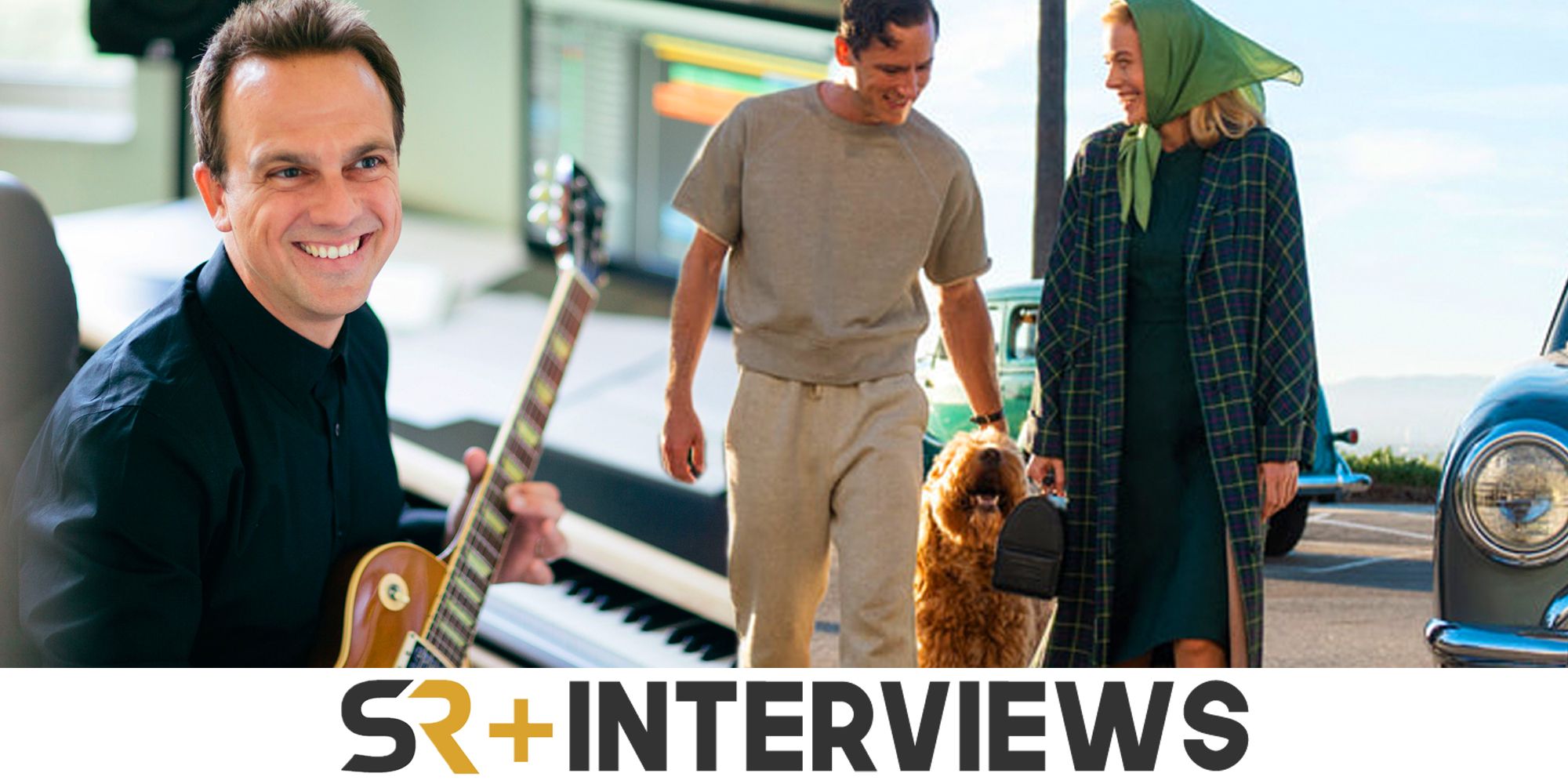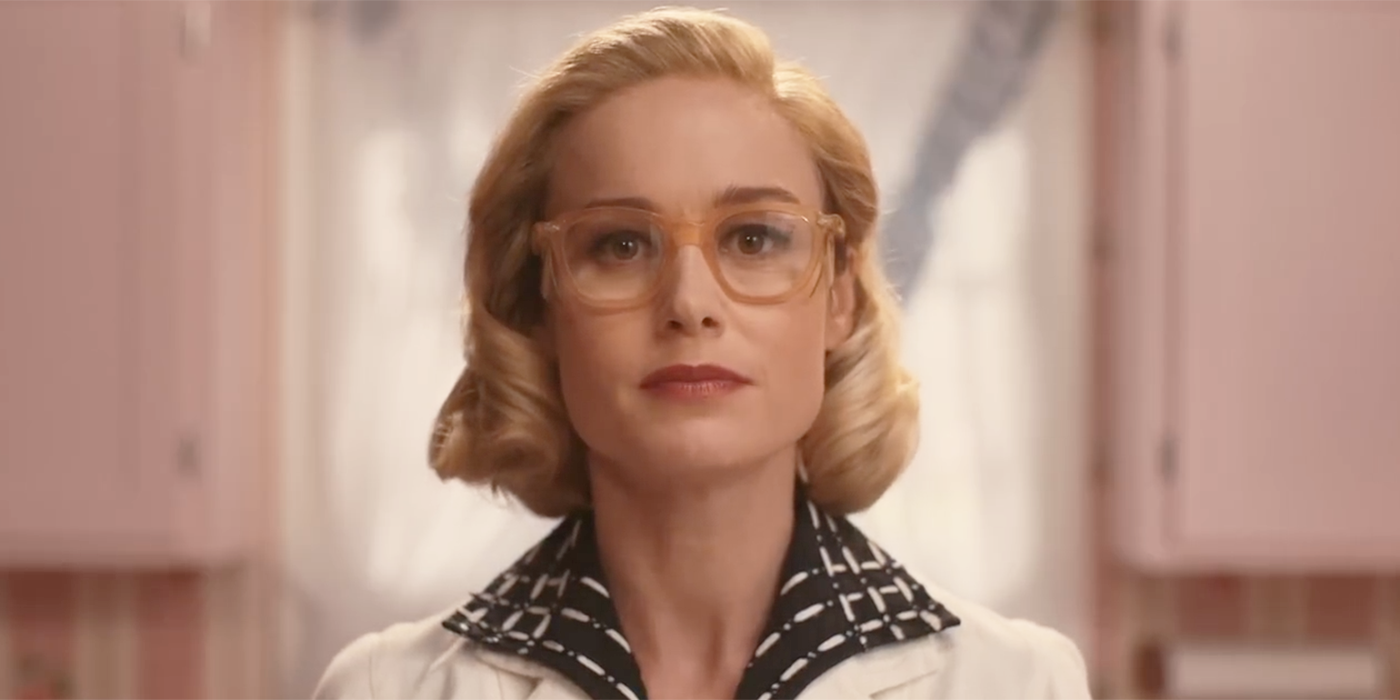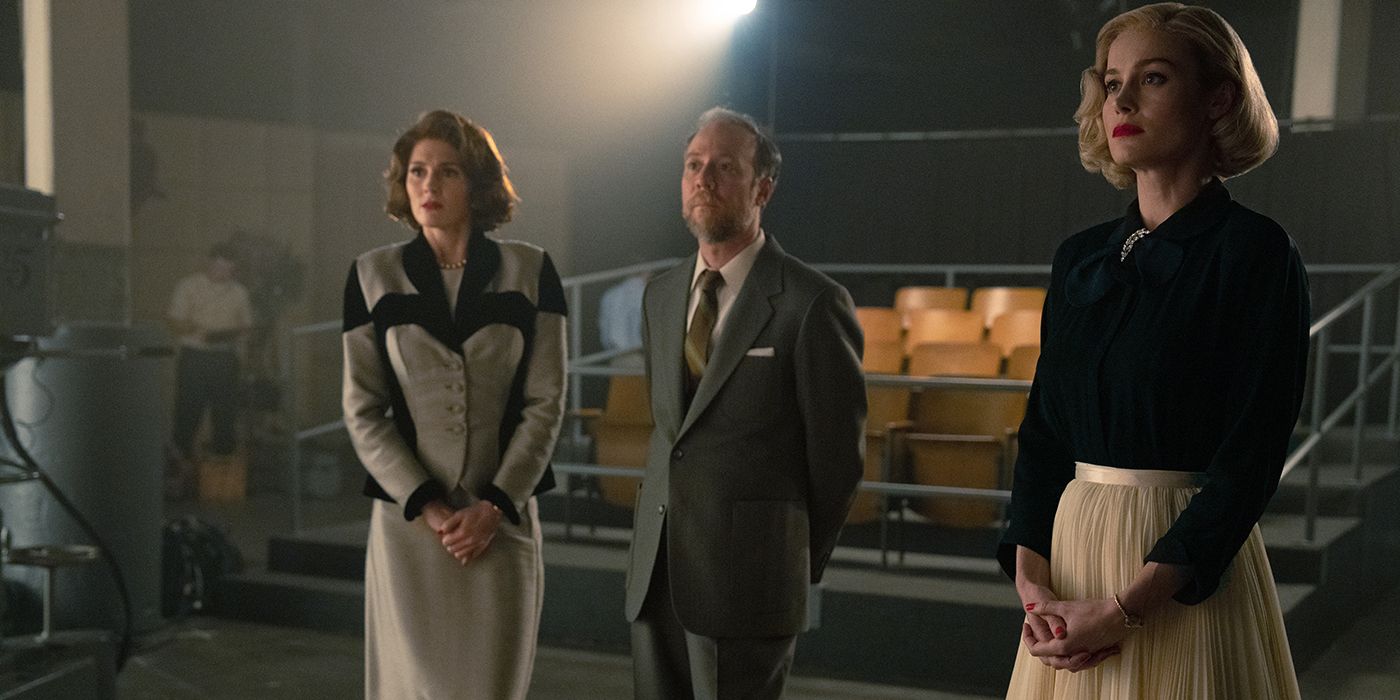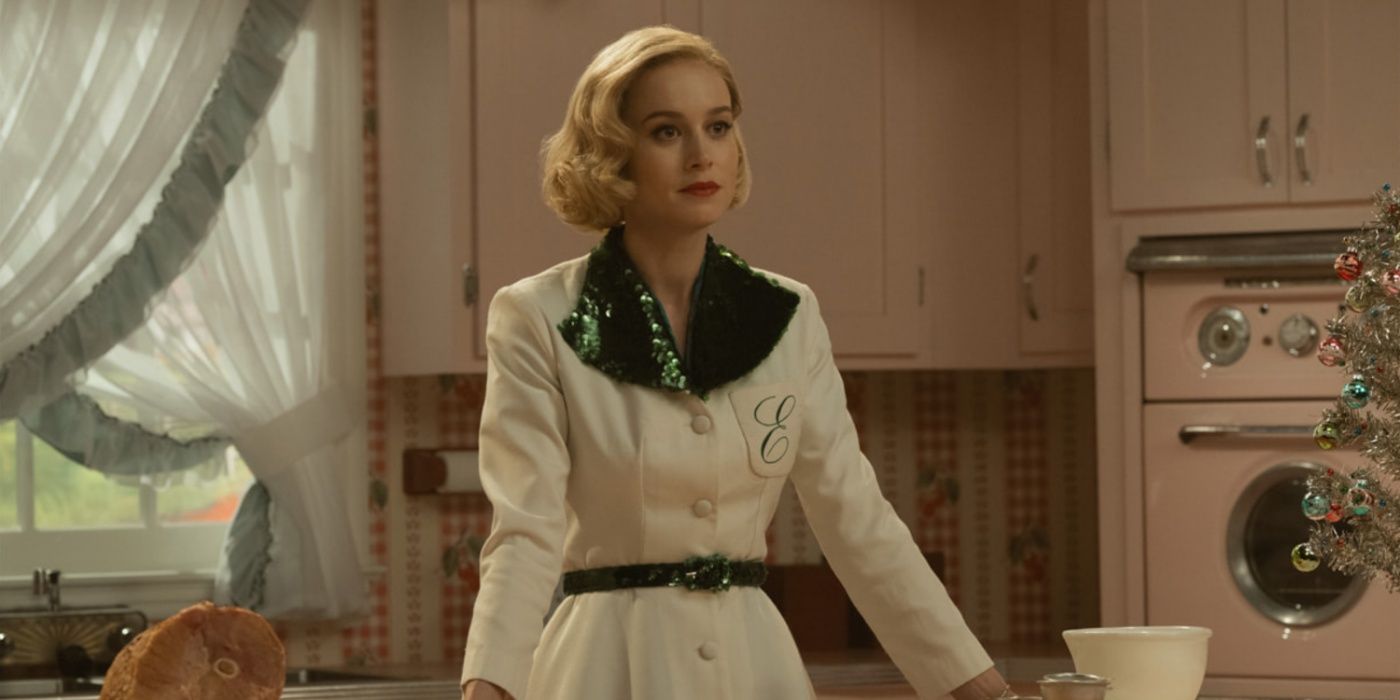Summary
- Lessons in Chemistry is a new drama series on Apple TV+ that challenges gender roles in its 1950s setting through the character of Elizabeth Zott, played by Brie Larson.
- Carlos Rafael Rivera, the Emmy-winning composer, created the musical score for the show, using a blend of conservative orchestration and synthesis to create an interesting and immersive soundscape.
- Rivera drew inspiration from various influences, including Journey, Rufus Wainwright, Billie Eilish, and Randy Newman, to create themes for the characters that reflect their personalities and experiences. Collaboration with the showrunners helped enhance the storytelling through music.
Lessons in Chemistry is a new drama from Apple TV+ created by Lee Eisenberg (The Office, Little America) and directed by Sarah Adina Smith (Hanna). The series is based on a book of the same name by Bonnie Garbus, which was released in 2022 and was the author’s debut novel. Aside from the fact that it is bringing Brie Larson back to television, Lessons in Chemistry is exciting for the way it promises to challenge the gender roles of its 1950s setting through the eyes of Larson’s character, Elizabeth Zott.
Carlos Rafael Rivera provided the musical score for Lessons in Chemistry, and it’s not his first trip to the middle of the century. Rivera is an Emmy-winning composer whose previous work includes The Queen’s Gambit and Godless. Rivera is also a protégé of legendary film composer and songwriter Randy Newman, and a teacher at the Frost School of Music at the University of Miami.
Related: Lessons In Chemistry Trailer: Brie Larson Stars In New Apple TV+ Show
Carlos Rafael Rivera spoke with Screen Rant about the soundscape he created for Lessons in Chemistry, crafting themes for its main characters, and more. Note: This interview was conducted during the 2023 SAG-AFTRA strike, and the show covered here would not exist without the labor of the actors in that union. This interview has also been lightly edited for length and clarity.
Carlos Rafael Rivera On Lessons In Chemistry
Screen Rant: What about this story drew you to this world? How’d you get involved with the project in the first place?
Carlos Rafael Rivera: I was pretty much clearly asked because of The Queen's Gambit. I think that with the storyline, as I was first approached, they felt there was a kinship between the characters, the time [period], and they liked the work I'd done on that. As I came into it, the first music I wrote had classical guitar and it was a very conservative score. And it wasn't meshing; the guitar wasn't meshing well.
I know Sarah Adina Smith, the director of the first few episodes, who was like, “What if music was trying to represent a biogenesis? What will we do?” I was like, “Well, I don't know.” I had no idea. One of the things that she had me do was listen to Aphex Twin and Boards of Canada--a completely different direction--and I started writing music that would be like the creation of life, and [was] very bubbly and very synth-heavy.
That was something that really affected [the score] because it wasn't the right direction either, but because we had gone to complete opposite ends of the spectrum, what you do end up getting is something where it's piano-centered, and you have strings and your standard orchestra, but then there are synthesizers and things that I started thinking would be like glassy, like things that you find in a chemistry lab. There was an idea of trying to emulate glass. The time-setting vibraphone felt like it was a good thing. [I used] marimba, and then some of the synthesizer stuff had glassy sounds and airy sounds that made it feel energetic. Had we not tried that attempt, we wouldn't have gotten to the direction we did, and I think it's a nice blend of the standard conservative orchestration with some synthesis that I think makes it interesting, hopefully.
The Queen’s Gambit is set in a similar time period. Do you have thoughts on when or if you want to touch on the time period musically? It doesn’t sound like you’re really trying to do that, but I’m curious how much that’s in your head.
Carlos Rafael Rivera: I think you're aware of what's happening, and you're looking at the visuals and the beautiful set design, and the beautiful work on production values that you're seeing come in on the dailies as well. You always want to write and rise up to that; whatever you're seeing, you want to react to. But more importantly, I'm always thinking of the characters way above the time period. I'm thinking of what the characters are doing, and what the challenges they're faced with are, and seeing how you can present music in a way that's not in the way. It’s supposed to be hopefully just supporting the story and making you get that much more immersed in it.
Do you like to write a lot of themes and have a lot of thematic material for the characters, or do you try to limit how much you're doing that?
Carlos Rafael Rivera: I do love writing dramatic music. It’s the biggest challenge, I think. Growing up, I very much was a fan of the idea of melodic writing. There are different composers that have different strengths; this is one of the [things] that I find myself challenged with, and that I love to do. Writing melody is sort of it for me.
For Elizabeth Zott, I ended up writing something that would be as meandering as her life. Her life has very unexpected turns, and what came out at first turned out to be the main title. It ends up playing in the eighth episode; I called it “Lessons in Chemistry” on the soundtrack. Her life has so many unexpected turns that I really wanted to write something that would feel representative of that.
For Calvin, ultimately, his character is like the heart of the story. What's interesting about Elizabeth Zott is, she's someone that if you met, you may not necessarily like. [With] Calvin, [it’s] the same thing, but they found each other. Calvin brought out the human heart that Elizabeth has always had, but because of life events, had closed up to a certain degree. So, that theme really felt like it was the heart of the whole story.
This is kind of a nerdy one. I love your string writing. There was one piece, “The Remsen”, in which you did such a great job of giving the different instruments their own voices. How much thought do you give to making them all have their own identity while still working together?
Carlos Rafael Rivera: I teach at the Frost School of Music, and I've been teaching forever. It’s my day job, and I'm not planning on quitting it; I love it. What I do teach students as they're writing thematic ideas or [doing] line writing, it's like, “Pick a lane.”
Most people write melody and chords to the idea, and they kind of move that way. Motorizing, or adding a motor to that idea, without drums is a hard thing when you start. I started in a rock band, so I was like, “What do you mean, there's no drums in an orchestra?” They're like, “Well, there's percussion,” but that ain’t a drum set.
The reason I'm bringing all this up is because I do feel like, when you are writing and giving roles to musicians, it's very good when they know where they're going. Even if it's the viola--not the violin [that], let's say, is playing the melody. When you have somebody doing something, you want to make sure that whoever is doing the other thing is completely clear in that line, and that line has a purpose. It's not just doing this, then [partially playing] the melody, but then [jumping] to the bassline.
It's almost like performers. You're not going to give a background actor a lead line. It gets confusing to the audience as to who's in charge. Everybody has a role to play, and I always do think of my cues as having to have clarity and purpose for all the musicians that are playing. That, ultimately, is something that I find is effective.
I'm glad you're calling out that idea, but really, if you listen to it, there is a lot of, “What are the violas doing? What’s the bass doing?” I even arrange the orchestra and piano. The piano isn't necessarily a recorded piano that takes up the whole stereo space; usually [with] the piano melody, I will shift it to the left, and the bass will be to the right. I break it up in a way that really feels like a choir, [with] high notes to low notes in the sonic experience.
And that's just something unique that I found myself always [doing]. It was really born out of getting out of the middle because the middle is where the dialogue is. The middle is where the lead instrument is, always, and the lead instrument is the performances by the actors. I stay out of the way, left or right, and let the dialogue drive through.
You talked about going the synth way and the guitar way, but with my limited classical knowledge, some of the piano pieces reminded me of Debussy a little bit, in that they were very [sparse], beautiful, and melodic. Did you have those kinds of influences in your score at all?
Carlos Rafael Rivera: I think that all of it is an influence. I've been listening to Journey a lot--Journey the band--and I know it’s because I'm old, and I don't care. But there are bands that I listened to in my youth, and it's Ozzy Osbourne to a lot of the ‘80s bands [and] ‘70s bands. I listened to Rufus Wainwright, who I think is a fantastic melodist. He’s one of the great melodists today, still, and even Billie Eilish. There’s something about that last tune that she did for the Barbie film, her and Finneas, of course; they're onto something bigger than whatever the fame is, and they're pretty frickin’ famous. I think their stuff is going to be around for a while. But [my influences go] all the way to the classical.
I'm more connected to music today because I have kids that are in their teenage years, and that's all they do. I find myself very attracted to whatever I can get my hands on, but I'm not thinking, “Oh, this feels like this.” If anything, in the theme for Mad [is] an homage to my mentor, Randy Newman, who I mentored with for a while. We still communicate to this day, and his style is something that I've always respected and loved.
It kind of came about because, being a parent myself, when you have your kids, they're nothing like you. You see some traits, and you see some things, but they're just totally different people. So, I had a melody for Elizabeth, I had Calvin’s music, but I wanted Mad to be just not them, in the way [that] I feel like my kids are not me. Stylistically, it almost feels like it doesn't belong in the show, but it somehow worked. It somehow played and it went with the scenes.
Of course, the ultimate thing that matters is the approval by the showrunners, Lee and Natalie. They were just very great to work with; they were excellent. As a matter of fact, I really enjoyed getting notes from them. They kept [going], “Is the music leading? Is the music leading too much?” And I was like, “Yeah, maybe it's leading too much.” I hadn’t ever heard of that, and that was one of the coolest things
There wasn't a session that we had that didn't have a ton of notes. Usually there were always notes and revisions, but they were worth doing. It was always worth it. I do think it made the show better. That’s why I love doing this: because you're collaborating; you're not just writing and giving music to people, you're having a conversation, and you're helping tell a story, which is the ultimate privilege.
Is there anything about the show that you’re most excited for people to see once it’s out?
Carlos Rafael Rivera: I think there were a couple moments that I felt really lucky to score. You always do have those cheesy moments as a kid, and you have an idea of, like, “Oh, it'd be great to write for this person.” One of the biggest moments in my life was scoring… the first movie I did was A Walk Among the Tombstones with Liam Neeson at the time when he was in Taken, and [had] all these big movies he had done. He punched somebody, and I wrote [something for it]. I was like, “This is the coolest moment.”
I'm proud of a cue in the soundtrack; it’s called “Best Alone”. It’s simple, but it's that kind of thing. It's simple, but it really works, and it works specifically to picture. It’s in episode seven. [“Best Alone” will] make sense when you watch episode seven; the idea of the title is really relevant to the scene
Then, there’s that nerdy moment where Brie Larson--who is a fantastic actor--is running in slow motion towards the end of chapter three. It’s this very powerful experience to write music that supports that. I felt like I got to write that scene. That's one of those moments where you're like, “Oh, man, I got to score that. That's so exciting.”
I hope, if anything, the audience takes away that the story is relevant, it's great, and it's well-told. I was really proud to be part of this production. That’s definitely one of the takeaways for me: I got to be part of this.
About Lessons In Chemistry
Set in the early 1950s, “Lessons in Chemistry” follows Elizabeth Zott (played by Larson), whose dream of being a scientist is put on hold in a patriarchal society. When Elizabeth finds herself fired from her lab, she accepts a job as a host on a TV cooking show, and sets out to teach a nation of overlooked housewives — and the men who are suddenly listening — a lot more than recipes.
Also check out our interview with showrunner Lee Eisenberg and director Sarah Adina Smith.
Lessons in Chemistry premieres on Apple TV+ on October 13th.




